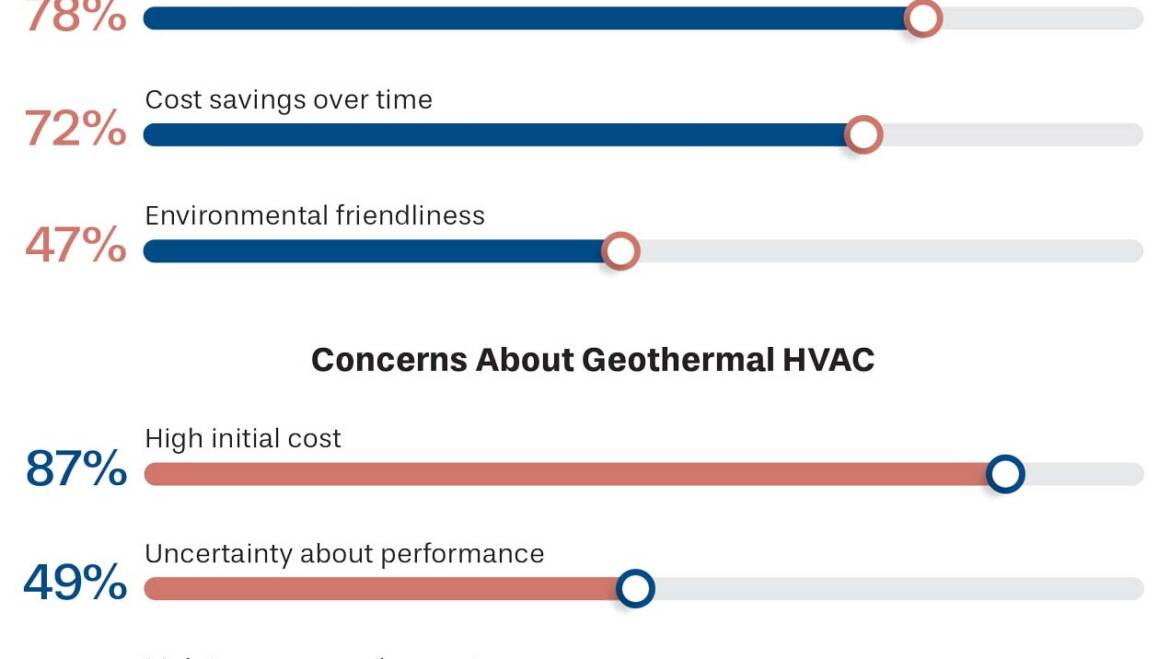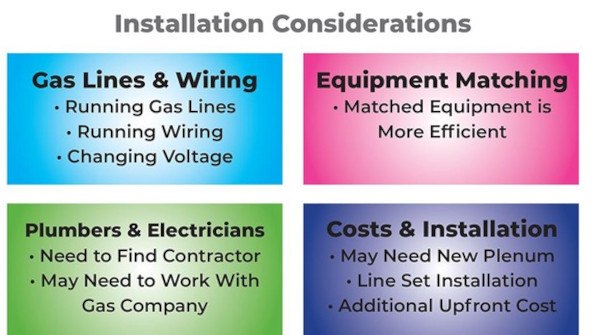What do homeowners know about geothermal HVAC? Is it accurate? And are they interested?
These are all questions that geo contractors are asking themselves, and thanks to a new study by The ACHR NEWS, these questions can be answered with a good degree of accuracy.
The study, conducted by myCLEARopinion Insights Hub with the support of Climate Control Group, surveyed 129 residential contractors, 128 commercial contractors, 124 homeowners, and 122 facility managers.
When asked what they see as the benefits of geothermal, homeowners in the survey had two overwhelming responses: 78% highlighted energy efficiency, and 72% said cost savings over time. Lower on the list were environmental friendliness (47%), low maintenance, and durability/longevity.
As far as concerns? High initial cost topped the list (87%), followed by uncertainty about performance (49%), maintenance requirements (46%), and complexity, installer availability, and disruption during installation.
– Joe Parsons
senior marketing sustainability manager
Climate Control Group
Myths, Facts, and Data
Joe Parsons, senior marketing sustainability manager at Climate Control Group, said having this research gives contractors an advantage: being able to speak directly to the things that homeowners are interested in and concerned about.
“Ultimately, it comes down to educating the homeowner to help them make an informed decision,” he said.
GOOD AND BAD: If a geothermal contractor is correctly educating homeowners on geothermal systems, the benefits will begin to far outweigh the cons. (Courtesy of myCLEARopinion Insights Hub)
Contractors can emphasize the benefits of geothermal — particularly those listed above — to help homeowners understand how geothermal heat pumps can work for them.
“The efficiency of a geothermal system is unmatched,” said Kyler. “They are up to 500% efficient. A good HVAC contractor will run the loads on the house and run a geo designer that will show the homeowner the size of equipment they need, the size loop required, and a comparison of other systems for efficiency. The proof is in the pudding.”
“Geothermal is the simplest system to maintain and provide tech support for,” said Dona Kyler, vice president of Indiana Geothermal in Indianapolis, Ind., and president of New York Geothermal Supply. “As far as the homeowner is concerned, the maintenance is minimal. A conventional system requires fall and spring tune-ups. Geothermal is easy. Keep your filters clean by changing them as needed, and make sure your drain pan is free of clogs. That is really all that is needed. There is so much geothermal training out there, and once [geo technicians] are familiar with them, they are easier to work on than any other system.”
Contractors may also find themselves in the position to do some myth-busting.
Will a contractor have to tear up a homeowner’s yard a bit during the install? Yes. But, due to there being no outdoor unit, no freon lines to tune, and no flue pipe going through the roof, installation is much easier than some may think. There are also options for the various kinds of loops that can be used, and the efficiency of the system will likely make up for the short-term annoyance of the installation.
Is the upfront cost of a geothermal system more than a conventional system? Yes. But well-prepared contractors can use this opportunity to show hard data with cost savings over time.
“A geothermal system will last twice as long as any conventional system, and local, state, and federal rebates and tax credits will help with the cost,” said Kyler. “But standing on its own, a geothermal system does not need any help, being the most efficient cost-saving system you can install in your home. The payback for an existing home is around four years. The payback on a new construction is day one. The amount added to your construction loan is less than the energy savings at startup.”
Getting the Word Out
With the access of information leading to the plague of misinformation, it’s become even more important to ensure the truth about these systems is what’s being told.
“The internet is the No. 1 enemy of geothermal systems,” said Kyler. “The misinformation is rampant. An informative website and marketing plan are important.”
According to the survey, if a homeowner was seeking out information about geothermal HVAC, 90% would turn to a professional HVAC contractor or installer, 77% would use a search engine like Google, Bing, or Yahoo, 62% said an equipment manufacturer website, and 34% said peers/word of mouth. Additional information sources included retailers like Lowe’s or Home Depot, home services websites like Angi or Home Advisor, magazines or publications, and social media.

WHO SAID IT: Contractors have to continue to position themselves as a trusted source of geothermal information. (Courtesy of myCLEARopinion Insights Hub)
To set themselves up as a trusted source, geothermal contractors first have to establish credibility.
“Emphasize your company’s certifications (e.g., IGSHPA accreditation), experience, and number of successful installations,” said Parsons. “Ask questions and hone your listening skills, enabling you to further position yourself as an industry expert and build confidence with the homeowner. Walk homeowners through the installation process, addressing technical questions and providing clear, jargon-free explanations. Offer transparent project timelines and set realistic expectations about the process.”
Kyler said contractors should use customer testimonials anywhere they can, as referrals are the No. 1 source for an HVAC contractor’s business.
“They speak louder than anything you can say yourself,” Kyler said.
Additionally, Kyler said Google is a beast when it comes to marketing.
“Make sure you have someone on staff or work with a professional who understands the algorithms to get the best bang for your buck,” Kyler said. “And go to all the training — do not just say you are the best. Be the best.”
Personal Experience
Ultimately, the survey found that there’s a lot of room for growth in the geothermal market. It hasn’t caught on yet to every homeowner — in fact, it seems the homeowners that do want it are sometimes few and far between. But that’s not because the systems aren’t worth it. It’s because most homeowners haven’t had any personal experience with geo. Of the respondents, 57% of homeowners have never considered geothermal for their home, and 76% of them don’t have any friends or family with a geothermal system installed. So, contractors have to appeal to those types of homeowners, too.
Parsons said he’s found advertising in a contractor’s service area is a great way to capture the attention of potential buyers. Contractor websites, links to manufacturers’ websites, and email drip campaigns can also provide customers unfamiliar with geothermal the option of learning at their own pace.
“Once in-person contact is made, start with the basics: explain what geothermal is and how it works, using simple analogies and visuals to demystify the technology,” Parsons said. “Case studies on projects that a contractor has done, letters of reference, and contractor willingness to spend the time required to educate the potential buyer have been proven to reap dividends. It’s also essential to understand that the purchase may not come immediately, so staying in touch is vital.”
“Tell the geothermal story and quote it every time, even when they do not ask for it,” Kyler said. “No information is as bad as misinformation. Give them the knowledge to make the best decision for themselves. You might be surprised at how many customers go the geothermal route.”
– Dona Kyler
vice president
Indiana Geothermal
president
New York Geothermal Supply
Timing is Everything
Though most of the homeowners surveyed don’t currently have a geothermal system, they still have expectations of their contractors, project timelines, and cost/cost options.

DETAILS: Contractors can meet homeowner expectations by providing a detailed project timeline. (Courtesy of Climate Control Group)
According to the data, most homeowners expect detailed project timelines/schedules (77%), regular communication regarding concerns (72%), warranties/guarantees for potential property damage (69%), and the use of specialized equipment to minimize property disruption (49%).
When it comes to the cost of geothermal, nearly two-thirds of homeowners expect the cost of installation to be somewhere between $10,000 to $25,000. Just under half of respondents would be interested in a 36-month/no interest loan in terms of financing, while 22% would plan to pay in full. Data also shows that around three-in-five homeowners expect geothermal HVAC installation to take one or two weeks, and about a third anticipate the process taking three to four weeks.
Most installations take one to three weeks, depending on permits, site conditions, and system types. So, meeting timeline expectations can be done.
“This can be accomplished by providing a detailed project timeline, including permitting, drilling, installation, and restoration phases,” said Parsons. “Proactively communicate about potential delays or disruptions and outline steps to minimize impact. By addressing these concerns directly, providing transparent information, and positioning themselves as knowledgeable, trustworthy resources, contractors can help homeowners feel confident choosing geothermal HVAC for their homes.”
With each homeowner likely having their own specific expectations, contractors have to work to meet each set of them.
“If the geothermal unit is available, it does not take much time at all to install,” Kyler said. “If there is only one unit being installed, it can take one to two days. The more units, the larger the loop, the more time it takes. But it is not a two- to four-week process unless you are just looking at it from a scheduling issue with the HVAC company and the loop contractor. As far as installation is concerned, it is not bad. The real issue comes from a lack of communication. Tell them everything to set expectations upfront. Be a good communicator, and the referrals will come.”
Whether you require installation, repair, or maintenance, our technicians will assist you with top-quality service at any time of the day or night. Take comfort in knowing your indoor air quality is the best it can be with MOE heating & cooling services Ontario's solution for heating, air conditioning, and ventilation that’s cooler than the rest.
Contact us to schedule a visit. Our qualified team of technicians, are always ready to help you and guide you for heating and cooling issues. Weather you want to replace an old furnace or install a brand new air conditioner, we are here to help you. Our main office is at Kitchener but we can service most of Ontario's cities
Source link



